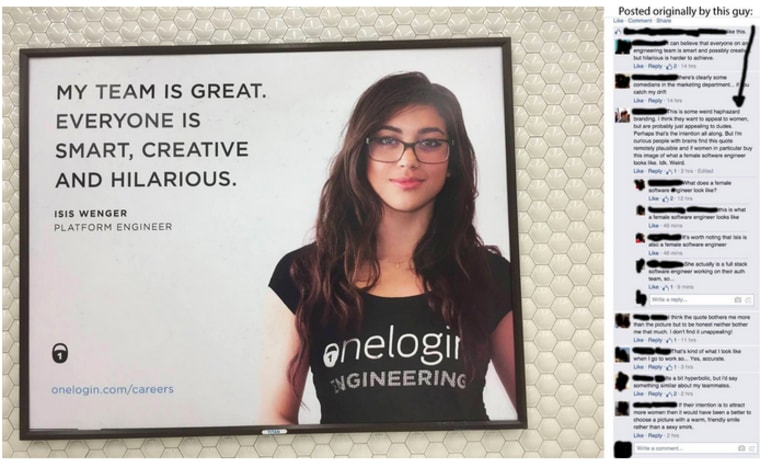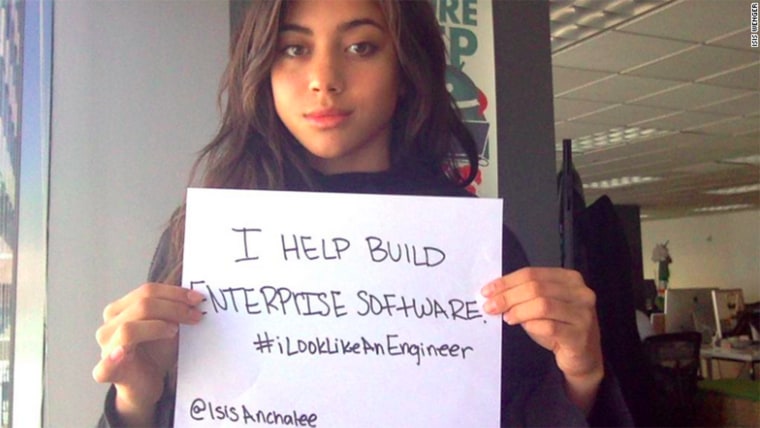The hashtag #ILookLikeAnEngineer has taken the Internet by storm, with tens of thousands of female engineers stepping up to the Twitter and Instagram plate to share photos of themselves accompanying the declarative hashtag. Even Chelsea Clinton is on board.
The hashtag was created by Isis Wenger, a 22-year-old platform engineer at the tech consulting firm OneLogin, who recently posed in a recruiting ad campaign for her company. The ad features a bespectacled Wenger wearing a OneLogin T-shirt and sporting a modest smile next to her name, and a quote about why she loves her job.

Once the ad hit the Internet, social media users were quick to shut Wenger down, doubting that she was an authentic employee at OneLogin because she didn’t look like an engineer.
RELATED: 'Redefining Girl': Book calls out teachers, doctors for gender stereotyping
"If their intention is to attract more women then it would have been better to choose a picture with a warm, friendly smile rather than a sexy smirk," one Facebook user posted in the comments section.
More deriding, mocking and ultimately insulting remarks ensued.
Unfortunately, as a young woman in an industry that is predominantly male and white, Wenger was used to this kind of negative reception.
RELATED: Lands' End adds science tees for girls after mom complains of gender stereotypes
“I've encountered many situations where people are unable to see past my external appearance,” Wenger told TODAY.com. “When I was first starting out in the industry, people were very condescending [and] had pretty low expectations of me — which has ended up working in my favor because I end up surpassing them exceedingly.”
Wenger has also cleverly surpassed her cyberbullies by turning #ILookLikeAnEngineer into a social media phenomenon. She said she chose that hashtag because it is intentionally inclusive.

“It addresses a problem that many people of different genders and ethnic backgrounds face,” she said.
Though Wenger’s message extends to all engineers, it has been backed and shared primarily by females from all over the world who have faced similar humiliation.
“I’ve frequently had guys saying to me something along the lines of ‘You’re too pretty to be a software engineer!’” Carola Nitz, a 29-year-old Berlin-based software engineer, told TODAY. “This mostly arises out of shows like ‘The Big Bang Theory,’ ‘The IT Crowd’ or basically every other show that depicts engineers as white males [lacking] social skills.”
Alisha Ramos, a 25-year-old front-end designer at Vox Media in Washington, D.C., also called out the media’s role in perpetuating the false image of what an engineer looks like.
“The visibility of female engineers is incredibly low across mainstream media,” Ramos told TODAY, pointing to the film “The Social Network”as an example. But Ramos also suggests that the tech industry itself isn’t without blame, adding that the visibility of female engineers is also low “at events such as conferences and talks, and across tech leadership in companies.”
RELATED: Princess Awesome dresses challenge gender stereotypes
One of the key reasons these women are embracing #ILookLikeAnEngineer is because it is bringing some much needed visibility to them. It’s also providing a platform of solidarity.
“This hashtag campaign [showed me] how many more amazing women should be followed [on Twitter],” said Natalia Berdys, a 31-year-old iOS engineer and co-founder at Tutu Lab in Krakow, Poland.
But perhaps most importantly, the campaign serves as an inspiring resource for future generations of female engineers, so that they can see, as Ramos points out, that “engineers come in all shapes and sizes,” and that “there isn't an ‘average’ or ‘ideal’ engineer; we're all different, and that's the beauty of it.”